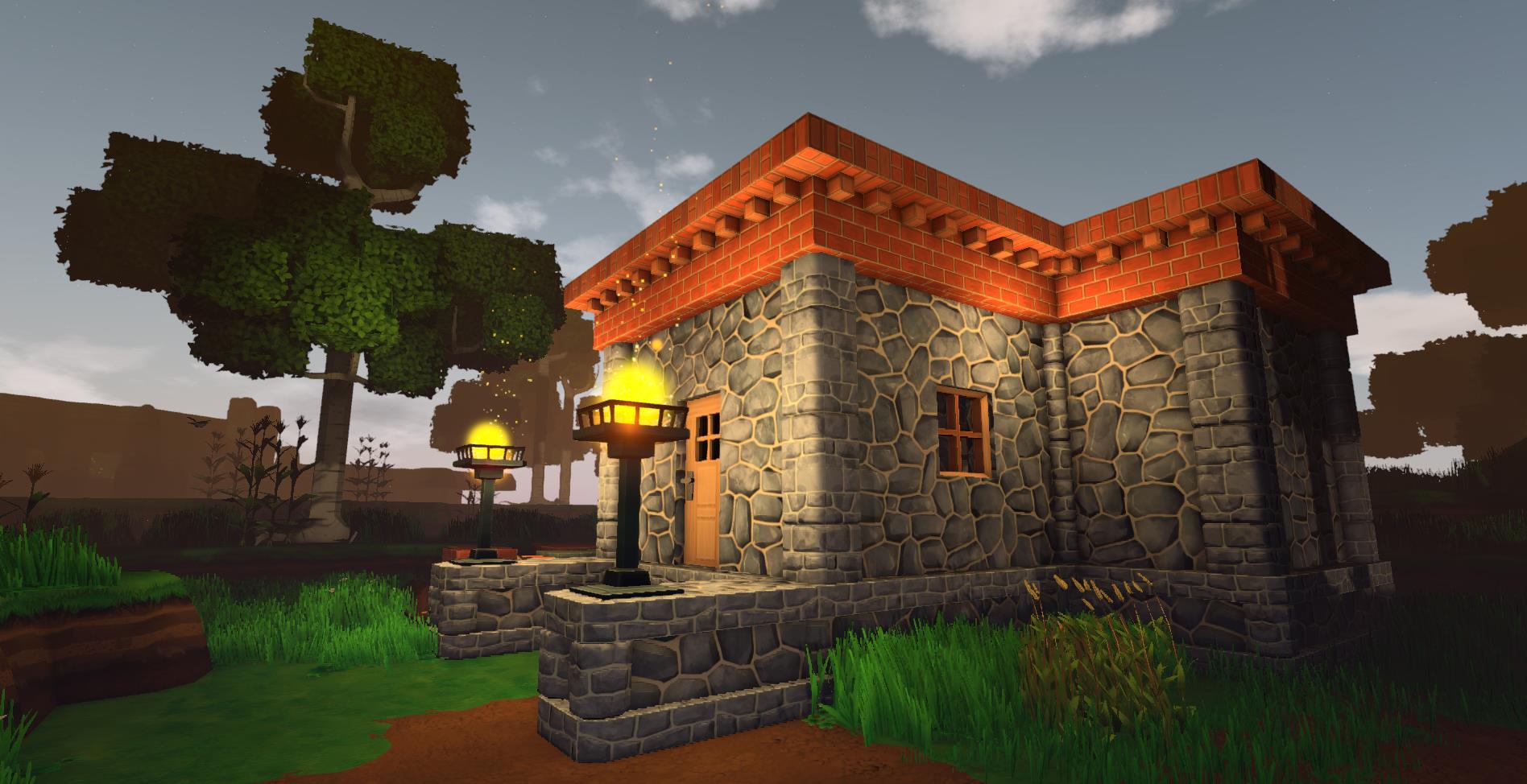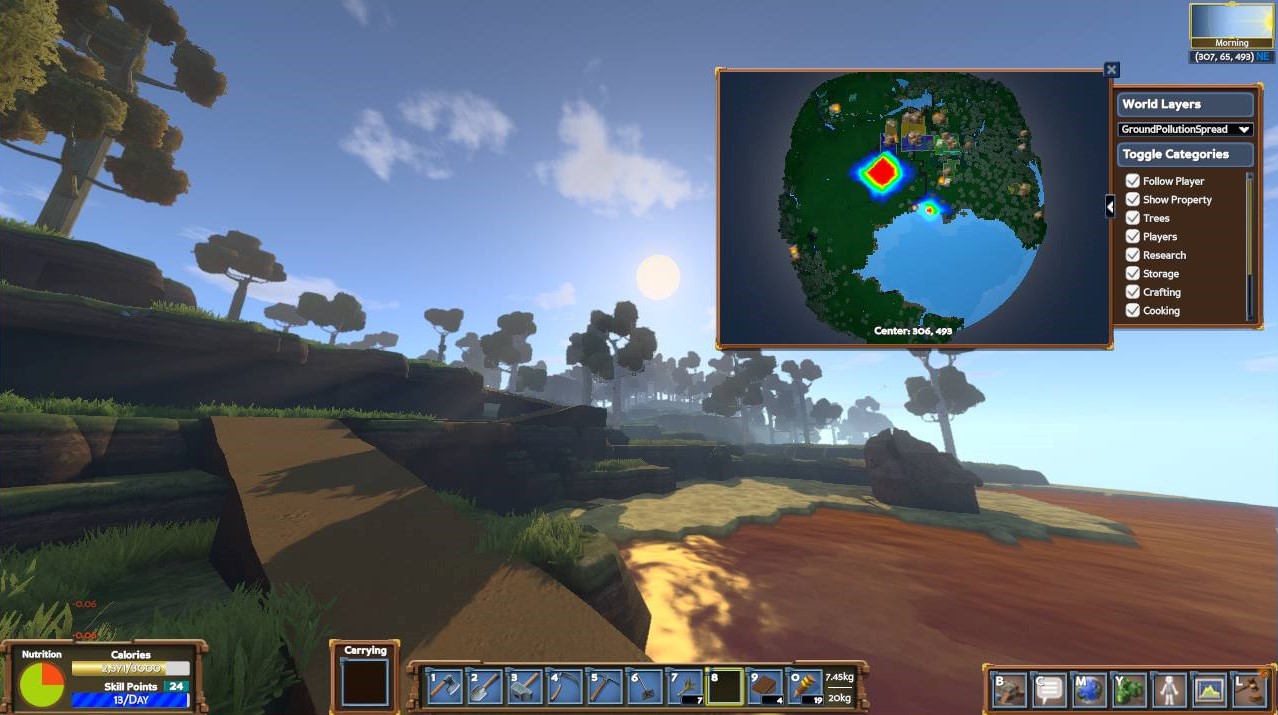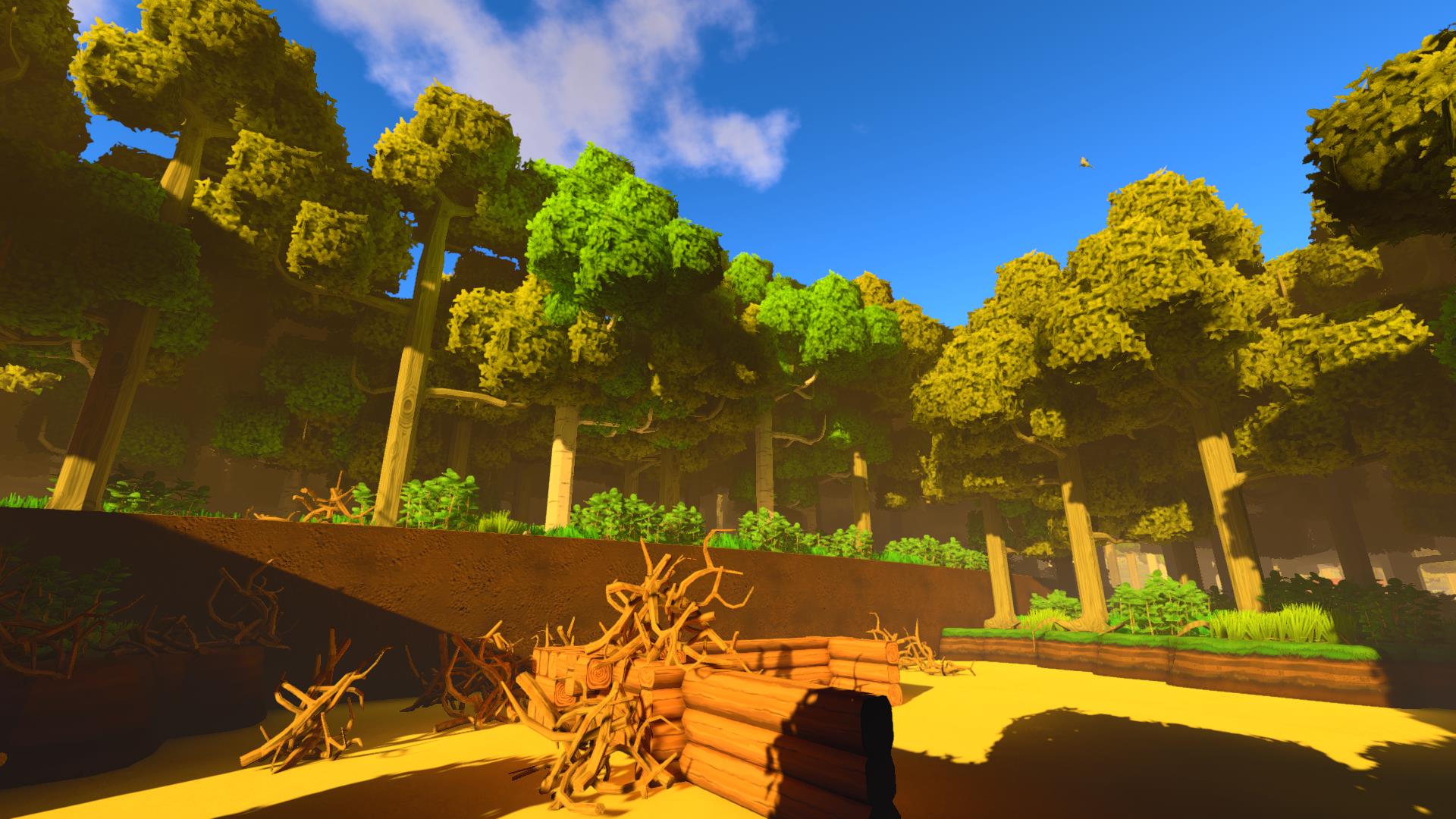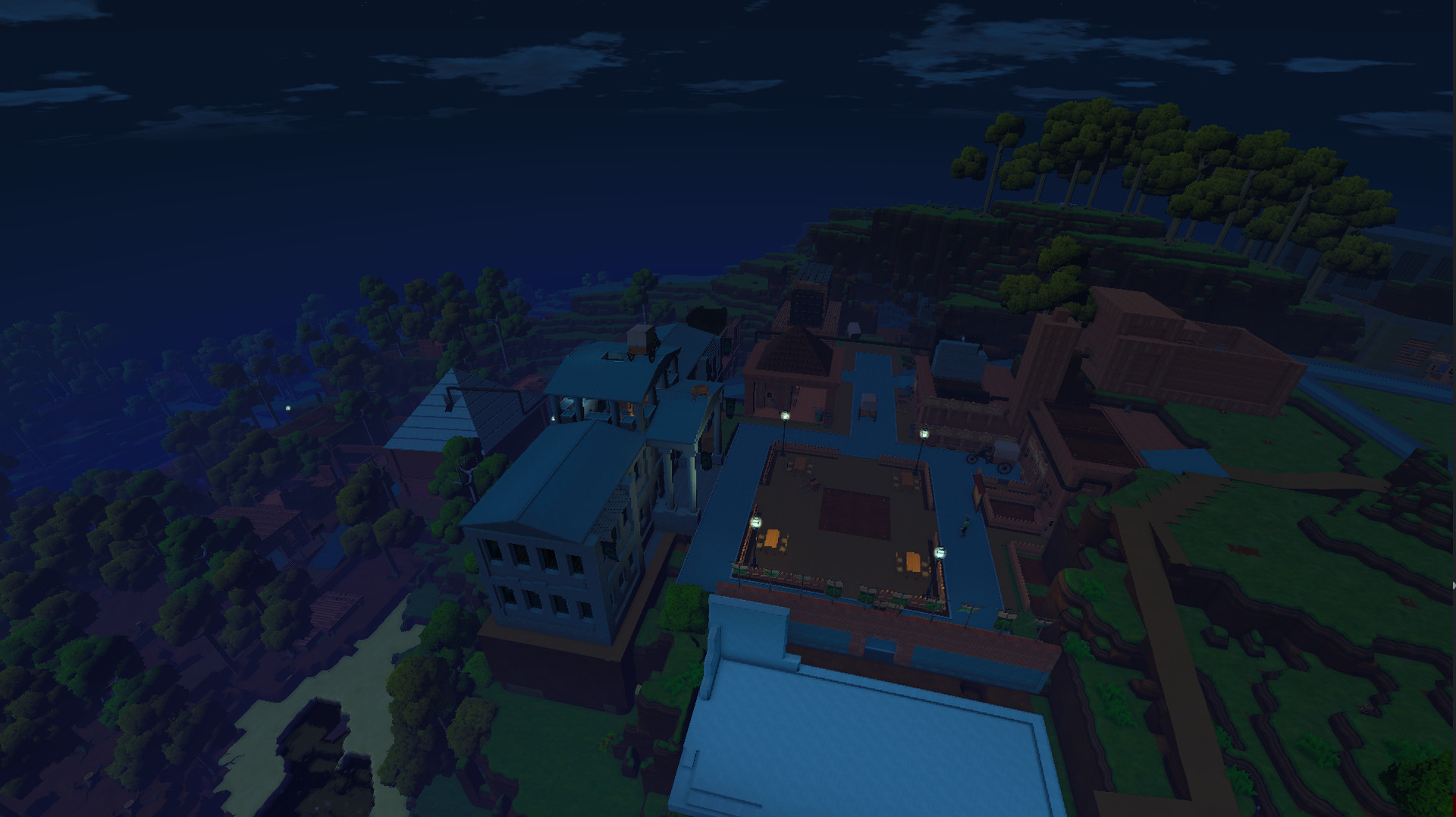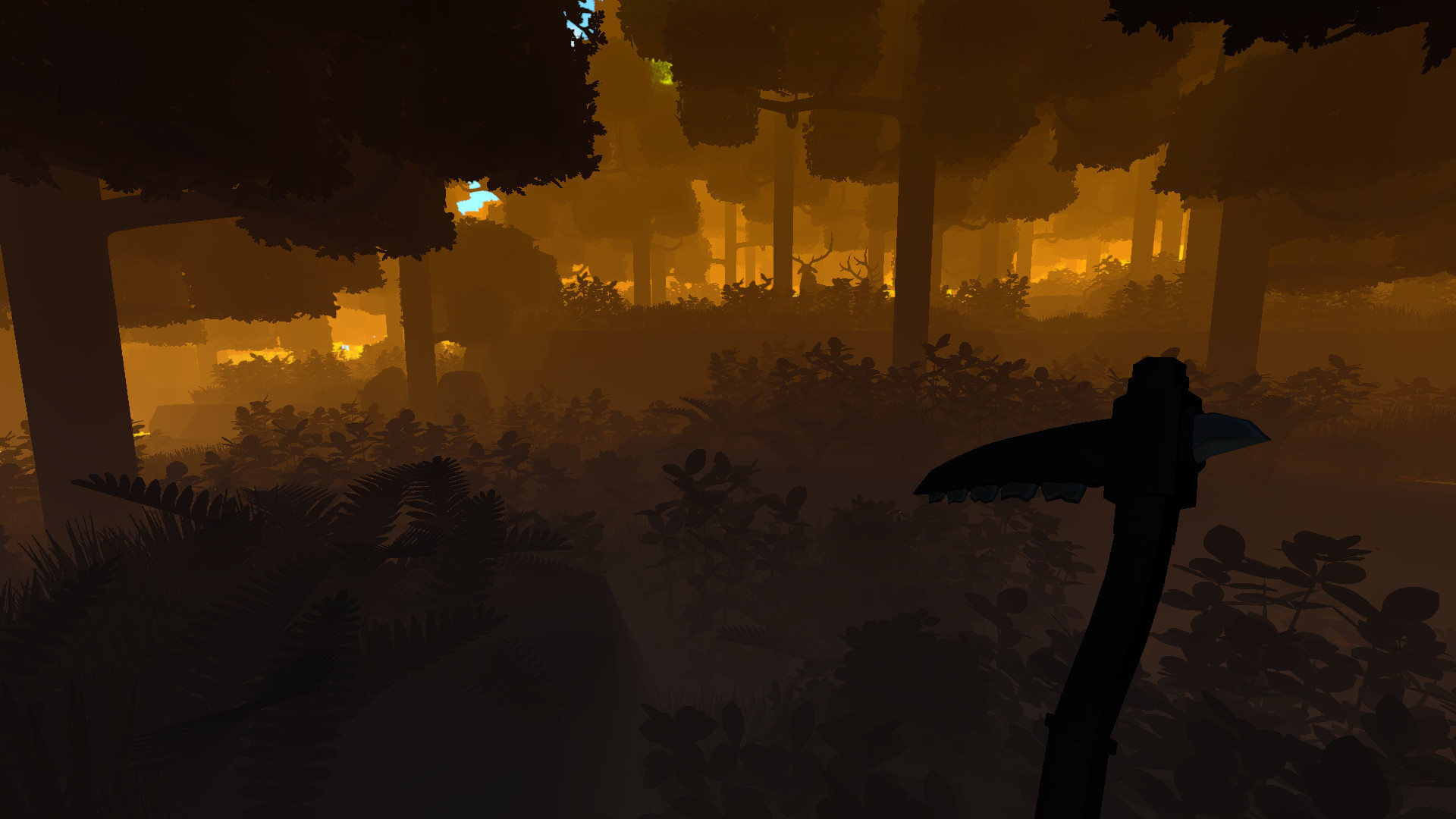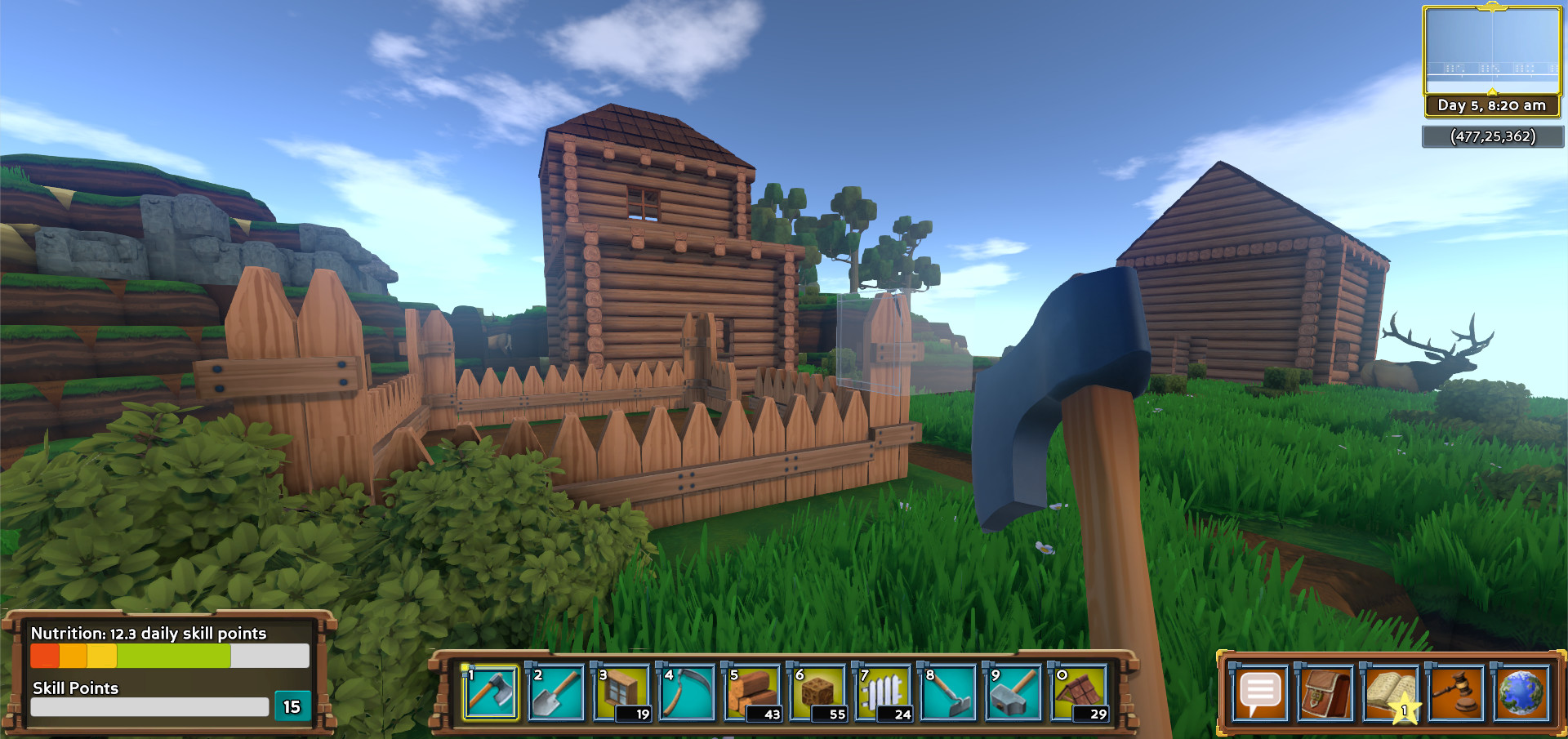Enter the world of Eco, where you must team-up to build civilization and prevent a disaster, using resources from a fully simulated ecosystem, where your every action affects the lives of countless species.
Will you and your fellow builders collaborate successfully, creating laws to guide player actions, finding a balance that takes from the ecosystem without damaging it? Or will the world be destroyed by short-sighted choices that pollute the environment in exchange for immediate resource gains? Or, do players act too slowly, and the world is consumed by a disaster that could have been avoided if you developed the right technology? In Eco, you must find a balance as a group if the world is to survive.
Enter humans into this equation, and things get complicated. It is the role of players to thrive in this environment by using resources from the world to eat, build, discover, learn and invent. However, every resource they take affects the environment it is taken from, and without careful planning and understanding of the ecosystem, lands can become deforested and polluted, habitats destroyed, and species left extinct.
In the extreme, the food supply of the ecosystem can be destroyed, along with all human life on it, resulting in server-wide perma-death. Eco is a game where the player’s actions have meaningful consequences.
Will you and your fellow builders collaborate successfully, creating laws to guide player actions, finding a balance that takes from the ecosystem without damaging it? Or will the world be destroyed by short-sighted choices that pollute the environment in exchange for immediate resource gains? Or, do players act too slowly, and the world is consumed by a disaster that could have been avoided if you developed the right technology? In Eco, you must find a balance as a group if the world is to survive.
A world-survival game
Eco is a survival game in a global sense, where it is not just the individual or group who is threatened, but the world itself. The world of Eco will be home to a population of thousands of simulated plants and animals of dozens of species, each living out their lives on a server running 24 hours a day, growing, feeding and reproducing, with their existence highly dependent on other species.Enter humans into this equation, and things get complicated. It is the role of players to thrive in this environment by using resources from the world to eat, build, discover, learn and invent. However, every resource they take affects the environment it is taken from, and without careful planning and understanding of the ecosystem, lands can become deforested and polluted, habitats destroyed, and species left extinct.
In the extreme, the food supply of the ecosystem can be destroyed, along with all human life on it, resulting in server-wide perma-death. Eco is a game where the player’s actions have meaningful consequences.
- Everything you do affects the ecosystem, and players can destroy their food supply and world (server-wide permadeath)
- Create a player-run government to make decisions as a group, proposing and voting on laws
- Use data gathered from the world to propose and vote on laws as a group. Debate with scientific argumentation.
- Create a player-run economy that allows you to sell not only good but services in the form of server-enforced contracts (simulating a player driven quest system).
- Your food level determines your skill-increase rate, making food very important and tying players directly to the ecosystem from which it comes.
- A game with goals higher than entertainment. We plan to build it for schools as an augmented classroom world students share.
Developer Blog: Labor System
New Government system: Constitution
New Government system: Elections and Elected Titles
New Government system: Demographics and Wages
New Government system: Laws Part 1: Using the system New Government system: Laws Part 2: Taxes, Ownership, Property, and Wealth New Government system: Laws Part 3: Tour of different actions, and Executive Actions New Government system: Districts
New Crafting: Work Parties
New Crafting: Labor System (This blog) New Crafting: Modules and Efficiency Redesign
New Crafting: New Tech Tree
New Building System: Hammer and new Building Styles
New Mining System: Mineral Dispersion and Drill Usage
New Mining System: New Processing Path and Pollution Info New Animal System: Attacking Animals New Ecopedia System
New UI New Audio New Hosted Worlds System[/olist]In update 9.0, all crafting projects will require calories to be expended in the form of labor. When designing labor, we had a few key goals in mind: Encourage more collaboration through the new labor market Increase food demand during the modern eras of technology Create a need for dedicated crafters to consume calories

Prior to the labor mechanic, as technology progressed and specialists became more proficient, the need for calories began to slowly decrease over time. Though resource gathering always consumed resources, many of the major industries had minimal calorie requirements. As a result, the market price for food tended to dip once larger farms were developed.
With the new labor system, progressively larger farms will be needed to supply the calories required for production. Advanced technologies will still increase the efficiency of resources use, but extra labor will be needed to keep up with the increased production.

Farmer using the new AoE Modern Hoe.
The labor market especially benefits farmers, hunters, and chefs. A constant flow of calories will be required to keep the economy running smoothly. To help keep up with this extra demand, we are introducing a variety of new bows and advanced farming tools (see tech tree blog ). In addition, we are adding new food recipes for chefs that can accept a larger variety of ingredients.

Crafting UI showing four different types of skilled labor costs.
All citizens can perform the basic labor needed for the early starter recipes to establish themselves. Beyond this, most recipes require skilled labor. To craft these recipes, labor must be provided by a citizen who has specialized in the related skill. More experienced specialists will be able to expend less calories while performing labor and help craft more advanced recipes.

Work order in progress with option to add labor.
Both resources and labor must be added before work on a project will begin. Labor can be added directly from the Crafting UI or by interacting with a placed crafting table. This encourages crafters to stay in closer proximity to crafting tables. While a work order is in progress, players will still be free to explore the world and interact with their surroundings, but work orders will occasionally need more labor added as new resources are acquired.
With this change, small producers will be able to find a role supplying towns with a local supply of resources. Large producers will have incentive to hire other specialists to perform the labor needed to keep their expansion stores stocked with inventory. Both scenarios make it easier for multiple players who share a specialty to contribute to society in their own way.

Economy Viewer showing different work parties available in the world.
Large scale projects, like researching new technologies and crafting new government buildings, require large amounts of labor and resources to be contributed. For big jobs like these that benefit the public good, there is incentive to have multiple citizens contributing labor to a single project. When collaborating on research projects, a work party can be created so all citizens that contributed will have access to the technology once completed.
Something we want to expand on in Eco in the future is the ability for players to form companies and act as a single corporation. Skilled labor, along with the new wage and work party systems, are important steps in this process. We are excited to see how players will use these new tools while establishing an economy.
- Todd Glenn, Developer, Strange Loop Games
Greetings Eco citizens! Todd here to present this weeks development blog focusing on our new Labor system for crafting. Labor introduces an exciting new layer to the economy which allows for a variety of new interactions between players.

Here's an overview of the Eco 9.0 blogs so far:[olist]
Maintaining Food Demand
One of the design pillars of Eco is to balance the needs of society with the impact on the environment. Part of this is the need to dedicate large areas of cleared land to agriculture. To make this possible, a steady demand for food is needed.
Prior to the labor mechanic, as technology progressed and specialists became more proficient, the need for calories began to slowly decrease over time. Though resource gathering always consumed resources, many of the major industries had minimal calorie requirements. As a result, the market price for food tended to dip once larger farms were developed.
With the new labor system, progressively larger farms will be needed to supply the calories required for production. Advanced technologies will still increase the efficiency of resources use, but extra labor will be needed to keep up with the increased production.

Farmer using the new AoE Modern Hoe.
The labor market especially benefits farmers, hunters, and chefs. A constant flow of calories will be required to keep the economy running smoothly. To help keep up with this extra demand, we are introducing a variety of new bows and advanced farming tools (see tech tree blog ). In addition, we are adding new food recipes for chefs that can accept a larger variety of ingredients.
Labor as a Resource
Crafting in the real world requires work to be performed as part of the production chain. In 8.3, crafting simply required the necessary ingredients and an active crafting table. Some crafting tables had an additional power cost while operating, but otherwise players could operate near limitless crafting tables placed around the globe without needing much interaction. Update 9.0 addresses this by adding labor as an additional cost to recipes to represent the human component.
Crafting UI showing four different types of skilled labor costs.
All citizens can perform the basic labor needed for the early starter recipes to establish themselves. Beyond this, most recipes require skilled labor. To craft these recipes, labor must be provided by a citizen who has specialized in the related skill. More experienced specialists will be able to expend less calories while performing labor and help craft more advanced recipes.

Work order in progress with option to add labor.
Both resources and labor must be added before work on a project will begin. Labor can be added directly from the Crafting UI or by interacting with a placed crafting table. This encourages crafters to stay in closer proximity to crafting tables. While a work order is in progress, players will still be free to explore the world and interact with their surroundings, but work orders will occasionally need more labor added as new resources are acquired.
With this change, small producers will be able to find a role supplying towns with a local supply of resources. Large producers will have incentive to hire other specialists to perform the labor needed to keep their expansion stores stocked with inventory. Both scenarios make it easier for multiple players who share a specialty to contribute to society in their own way.
Labor and Collaboration
A major benefit of the labor mechanic is the addition of a labor market to encourage collaboration. Previously, we showcased how players can hire skilled laborers to contribute to their crafting projects (see work parties blog ). We also previewed how new players will have an alternate route to progression by gaining experience while providing labor (see upgrade module blog ). These are just some of the ways that labor will promote more interaction.
Economy Viewer showing different work parties available in the world.
Large scale projects, like researching new technologies and crafting new government buildings, require large amounts of labor and resources to be contributed. For big jobs like these that benefit the public good, there is incentive to have multiple citizens contributing labor to a single project. When collaborating on research projects, a work party can be created so all citizens that contributed will have access to the technology once completed.
Something we want to expand on in Eco in the future is the ability for players to form companies and act as a single corporation. Skilled labor, along with the new wage and work party systems, are important steps in this process. We are excited to see how players will use these new tools while establishing an economy.
Summary
With this blog we will be wrapping up our preview of the new crafting system for 9.0, but we still have plenty of content to showcase in our upcoming blogs. I hope you have enjoyed this look at the new labor system and I look forward to sharing more during this weeks stream.- Todd Glenn, Developer, Strange Loop Games
[ 2020-05-13 23:57:38 CET ] [Original Post]
Minimum Setup
- Processor: Intel Dual-Core 2.4 GHz or AMD Dual-Core Athlon 2.5 GHzMemory: 2 GB RAM
- Memory: 2 GB RAM
- Graphics: NVIDIA GeForce GT 440 or AMD Radeon HD 5850 or Intel HD Graphics 4000 with 512 MBNetwork: Broadband Internet connection
- Storage: 2 GB available space
Recommended Setup
- Processor: Intel Core i5-2300 or AMD Phenom II X4 940 or betterMemory: 4 GB RAM
- Graphics: NVIDIA GeForce GTX 570 or AMD Radeon HD 7750 with 1 GB VRAM or betterNetwork: Broadband Internet connection
- Storage: 2 GB available space
GAMEBILLET
[ 6487 ]
GAMERSGATE
[ 1519 ]
MacGamestore
[ 2422 ]
FANATICAL BUNDLES
HUMBLE BUNDLES
by buying games/dlcs from affiliate links you are supporting tuxDB

